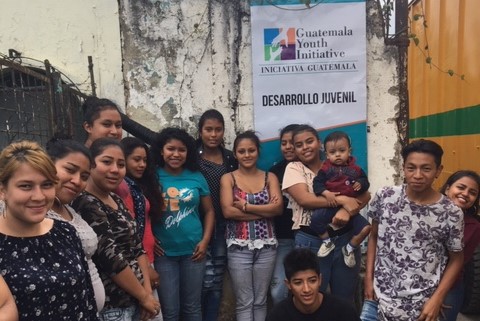 When working in sexual health, it’s important not to generalize. It’s easy to categorize the young women in need of contraceptives as the ones who sneak out of their houses or don’t attend school or church. But, in the few short months that the Guatemala Youth Initiative center has been open, we have seen that even the young women no one seems to worry about are in danger of unplanned pregnancy. That is to say, every girl who does not have access to sexual education is at risk of unplanned pregnancy. No matter how impressive they seem, young women without access to simple education about their bodies and their relationships are at a huge risk of becoming teenage mothers. Connie is one of the many young women who have taught us that lesson this fall.
When working in sexual health, it’s important not to generalize. It’s easy to categorize the young women in need of contraceptives as the ones who sneak out of their houses or don’t attend school or church. But, in the few short months that the Guatemala Youth Initiative center has been open, we have seen that even the young women no one seems to worry about are in danger of unplanned pregnancy. That is to say, every girl who does not have access to sexual education is at risk of unplanned pregnancy. No matter how impressive they seem, young women without access to simple education about their bodies and their relationships are at a huge risk of becoming teenage mothers. Connie is one of the many young women who have taught us that lesson this fall.
Connie is the pride of her community. The eldest of her 4 sisters and the niece of the community’s president, Connie grew up with responsible as her middle name. At 17, Connie is dependable, kind, and beautiful. In her free time, she works with a local NGO against domestic violence, an issue her own family has faced all too many times. She is taking her entrance exams to the local university, and plans to study law. “I’m going to get my degree and come back and change things,” she said, her voice firm. She speaks confidently and arrives punctually for every meeting. She is the girl that everyone counts on.
But Connie is also a young woman who grew up in a community where half of her peers become teenage mothers. She is a teenage girl who grew up in an education system that offers abstinence only approaches or ignores sexual education altogether, instead of promoting comprehensive sexual education. Connie’s best friend is already pregnant, as are most of the girls in her neighborhood. She mentioned that most of her friends aren’t using any modern form of contraception because no one ever told them they needed to.

Connie came to our office in tears, convinced that she was pregnant. Her words were almost indistinguishable, but our staff was able to identify the problem. She took the pregnancy test, and sat waiting, still sobbing. “I’m not ready to be a mom,” she said over and over. She had no idea how she was going to tell all the people who were counting on her if she was pregnant. “I will have to leave my house,” she said, thinking of her parents’ reaction. In the 10 minutes of waiting for the result, Connie was paralyzed; “Everything is going to change,” she said.
Thankfully, Connie’s pregnancy test came back negative and the relief in her eyes was overwhelming. As her tears dried, she immediately opted for a three month injection to protect herself. When she left, she was calm and collected. No one on the street would have guessed the crisis she had been through just an hour ago.

Stories like Connie’s are exactly why sexual education and access to contraceptives must be readily accessible to each and every young person as they grow up. Avoiding the topic in schools, homes and churches leads incredible young people like Connie to make decisions about their futures without complete information. There is no one specific profile of who needs sexual education. Both the honor student and the drop out deserve to learn about their sexuality and have access to contraceptives. Both poor and rich students need sexual education. Both young men and young women need complete information about what their futures can hold. In a community where unplanned pregnancy is almost normal, access and information change everything.

